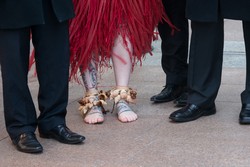Indigenous culture in a globalised world
IPCWPPB (Indigeneity in the Contemporary World: Performance, Politics, Belonging) studied film, theatre, dance and music festival events to find how indigenous performance engages with contemporary issues and debates through political, aesthetic and affective work. The scientific team provided a multifaceted and interdisciplinary study of the subject, dialoguing with various indigenous partners. Research was conducted on performances in the Americas, Australia, the Pacific and South Africa and on the transnational circulation of indigenous works in Europe. Researchers organised numerous events for international research, providing innovative analysis in the field. They also travelled to different countries, accessing remote repositories, recording performances in the making, and interviewing artists, cultural leaders and audiences. The project was divided across four interdisciplinary themes: Commodity and Spectacle, Reconciliation and Social Cohesion, Heritage and Material Culture, and Mobility and Belonging. These themes served as the analytical basis for understanding how indigenous aesthetics, values, knowledge and practices are transmitted and how creatively embodied art forms contribute to broader cultural movements. Researchers found a common interest in issues of social justice and postcolonial restitution, sovereignty, identity politics, cultural regeneration, environmental sustainability, and the local and global circulation of indigenous arts and artefacts. The project also examined ways in which digital media are integrated into indigenous repertoires and how they contribute to transnational dialogues, activist agendas and the sharing of arts practices. An international network composed of scholars, performance makers and cultural commentators was formed. The team compiled several edited books and journal publications and created a range of open access research tools, enhancing future research capacity. Team members served as advisors, translators, collaborators and facilitators for cultural events, benefitting international film festivals in Colombia, Ecuador, France and the United States as well as organising bodies that present indigenous arts through multi-arts festivals, museums and galleries. Audiences responded enthusiastically to the project's research at workshops, talks and other public engagement events. Project results have been published in written, oral, digital and video formats, and also presented at a highly successful exhibition in London in 2013, subsequently adapted for an interactive online platform. The project reached its scientific and cultural aims, raising understanding of a wide range of indigenous performances as the contemporary expression of arts, rather than as anthropological curiosities, and providing different viewpoints on crucial debates of our time.



